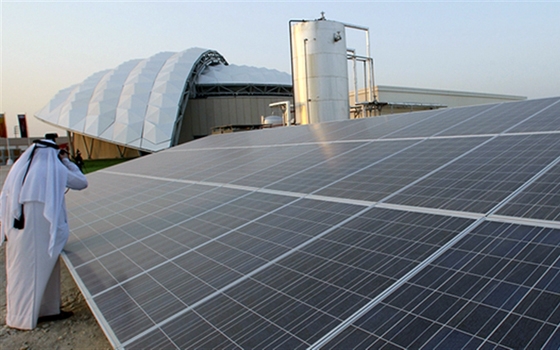Renewable energy as a global phenomenon has emerged in reaction to natural resources becoming limited and as more and more people are impacted by the effects of global warming and environmental degradation. Accordingly, most countries in the world are in the process of shifting away from heavy carbon economies to renewable energy technologies by reducing their carbon footprint.
In line with Qatar’s 2030 Vision, the country has taken tangible and determined steps towards deploying new and renewable energy and establishing Qatar as a technology development and research hub in these new energy industries. Solar power was a primary choice. Solar power technology has huge potentials in Qatar.
Qatar Foundation supports the country’s solar vision
Qatar Foundation for Education, Science and Community Development announced the launch of one of the Gulf region's first Energy Monitoring Centre (EMC) to manage its smart grid and monitor solar power generation across all sites within Education City.
Developed by GreenGulf, in partnership with Qatar Foundation Capital Projects and ASTAD Project Management, the EMC will enable real-time administration of all solar and power quality monitoring systems from a central location aiding in their efficient operations and maintenance. Further strengthening Qatar Foundation's overall sustainability efforts, the EMC will allow visitors, students and researchers to view individual system output and technical grid data, while familiarizing themselves with Qatar Foundation's various renewable energy initiatives.
The EMC is part of the recently completed Solar Smart-Grid Project that added a total of 1.68MW of new solar photovoltaic (PV) systems at various facilities within the QF campus. Qatar Foundation is now responsible for up to 85 percent of the country's total solar photovoltaic (PV) current installed capacity of roughly 4 megawatts. The project is also the first commercial PV project in Qatar to be granted approval for grid connection from Kahramaa.
The PV systems at Qatar Foundation now generate 5,180 megawatt hours of clean energy annually, resulting in savings of around 2,590 tons of CO2 emissions every year. The EMC will also be connected to the Kahramaa Conservation and Efficiency Control Centre to showcase the amount of solar energy Qatar Foundation's PV systems are feeding into the central power grid.
300MW solar plant opened
Last June, Qatar Solar Energy (QSE) has officially opened a 300MW PV module production plant, located in a Doha industrial zone, Qatar. QSE said that it collaborated with a number of leading PV equipment suppliers such as Meyer Burger, Eurotron, GT Advanced Technologies, Tempress, Asys, RENA, Rofin, Teamtechnik, Reis Robotic and Sunpreme as well as European R&D center, in addition to Al Jazari Center for Excellence.
QSE also has also secured module supply agreements with Jermyn Capital totaling 150MW to the Japanese market and a further 150MW module deal with Power Capital to supply the Thailand market. QSE has plans to expand production to 2.5GW.
Deals with Kazatomprom, Antaris Solar and SolarDrive
Qatar Solar Energy (QSE) and the multi-billion dollar Kazakhstan-based energy company Kazatomprom recently signed a ‘landmark’ agreement that will see large quantities of solar grade silicon provided to the MENA-region-based solar company at a very low fixed cost for the next ten years. This partnership is expected to secure the entire value chain from raw material to smart-grid development and provides a powerful foundation from which QSE will further expand its production capacity to 2.5 GW.
Kazatomprom, ranked as the world’s largest producer of uranium, has been active in renewable energy since 2009. The company implements a number of high tech innovative projects in the sustainable energy sector including the production of photovoltaic modules (Astana Solar), the production of ingots, wafers and cells (Kazakhstan Solar Silicon) and solar grade silicon production (Kaz Silicon).
On the other hand, Antaris Solar, an international provider of solar photovoltaic panels has officially formed a partner supply network with local installers in Qatar to service growing solar needs in the Middle East. The new partnerships will allow the installers to deliver superior service and support to the growing customer base in the regions. Middle Eastern countries are moving towards the use of renewable energy sources, and this trend isn’t likely to stop anytime soon.
Yet, Qatar Railways Company and Qatar Solar Technologies (QSTec) have signed a memorandum of understanding to install 80MW of solar technology in its rail depot facility at Doha, Technical Review Middle East has reported. According to the agreement, QSTec will help develop ground and rooftop-mounted solar photovoltaic (PV) installations at the 3,000 sq km rail depot facility, located near the new Sheikh Hamad International Airport.
Last month, Qatar’s ministry of interior launched an airport service vehicle, a smart car equipped with innovative advanced systems for "intelligent inspection" of the HIA's premises. Denmark-based SolarDrive was responsible for producing and installing the solar panels on the canopy of the MoI's smart vehicle. Based in Denmark, Ahrenfeldt said the company has been engineering and producing solar-paneled roofs for electric golf cars and utility vehicles for the past seven years. The smart car was a co-production of the MoI and Lekhwiya (Internal Security Force).
Varouj Tenbelian
22 September
























































